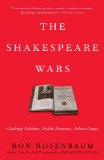I have to be careful here, since the name “Shakespeare” is, for whatever reasons, a loaded name in education. In the great culture wars surrounding media and literacy, “Shakespeare” seems to have become a kind of shorthand for all that may be lost of high culture. Let us not get into the irony here. What I want to touch briefly on is a thought in Ron Rosenbaum’s admirably gossipy book The Shakespeare Wars. Cutting through the academic debates surrounding Shakespeare, Rosenbaum is more interested in using these as a context for understanding why Shakespeare has moved him so personally and profoundly.
Given this almost phenomenological approach to navigation, I am perhaps less trepidatious than usual when he raises the question of Shakespeare’s privileged status. He in fact defers to Christopher Ricks’ criteria for the test of value in a work of art: “whether or not it continues to repay attention.” Clearly such a formulation does not get us off of many hooks. But Rosenbaum takes this as an opportunity to reflect on repetition over time as a kind of deepening.
Whether each time one returns to it, one returns not to a repeat performance, to a puzzle solved, but to a mystery deepened, compounded, one that continues to give back, repay attentiveness. Pays it back, so to speak, with interest in both senses of the word. With compound interest. Compound in the sense that the more times one returns and rereads, the more disproportionate is the return.
I cannot help but think of the haunting image of disproportionate interest in the Shakespearean corpus: the pound of flesh. But what grabbed my attention was the way in which this theme of repetition is given positive value. As I think of the continued, often apparently blind, repetitions of educational narratives it raises this difficult question: do we repeat them because we continue to find them of deepening interest, able to repay our efforts. Or because we fail to recognize our bad investments, amounting to a shell game, eventually calling for their pound of flesh?
Again, what I like about Rosenbaum’s approach is that he continues to return to the touchstone of personal, and profound, experience. And yet this does not necessarily free ourselves from any pre-existing contracts. It is easy enough to conjure up the image of the scholar, long since going through the motions, all the louder insisting on the Value of those motions, personally and culturally. And, as tends to happen around the question of Shakespeare, the issue of repetition is all too easily linked to the need for singularity and authenticity. I don’t take it that this is the deepening that Rosenbaum is talking about, but how do we distinguish?
Can we imagine repeating the stories of education without being held to all of the criteria of assessment that seem to draw us towards the rote? Or perhaps what amounts to the same thing, the incessant call to repeat but with feeling.
Could we take from the countless reproductions of the bard’s plays a different message, that of endless variation and experimentation? Repetitions without return?

… [Trackback]…
[…] Read More here: splittingskulls.com/chrismoffett/the-shakespeare-wars-and-a-pound-of-flesh […]…
… [Trackback]…
[…] Find More Informations here: splittingskulls.com/chrismoffett/the-shakespeare-wars-and-a-pound-of-flesh […]…